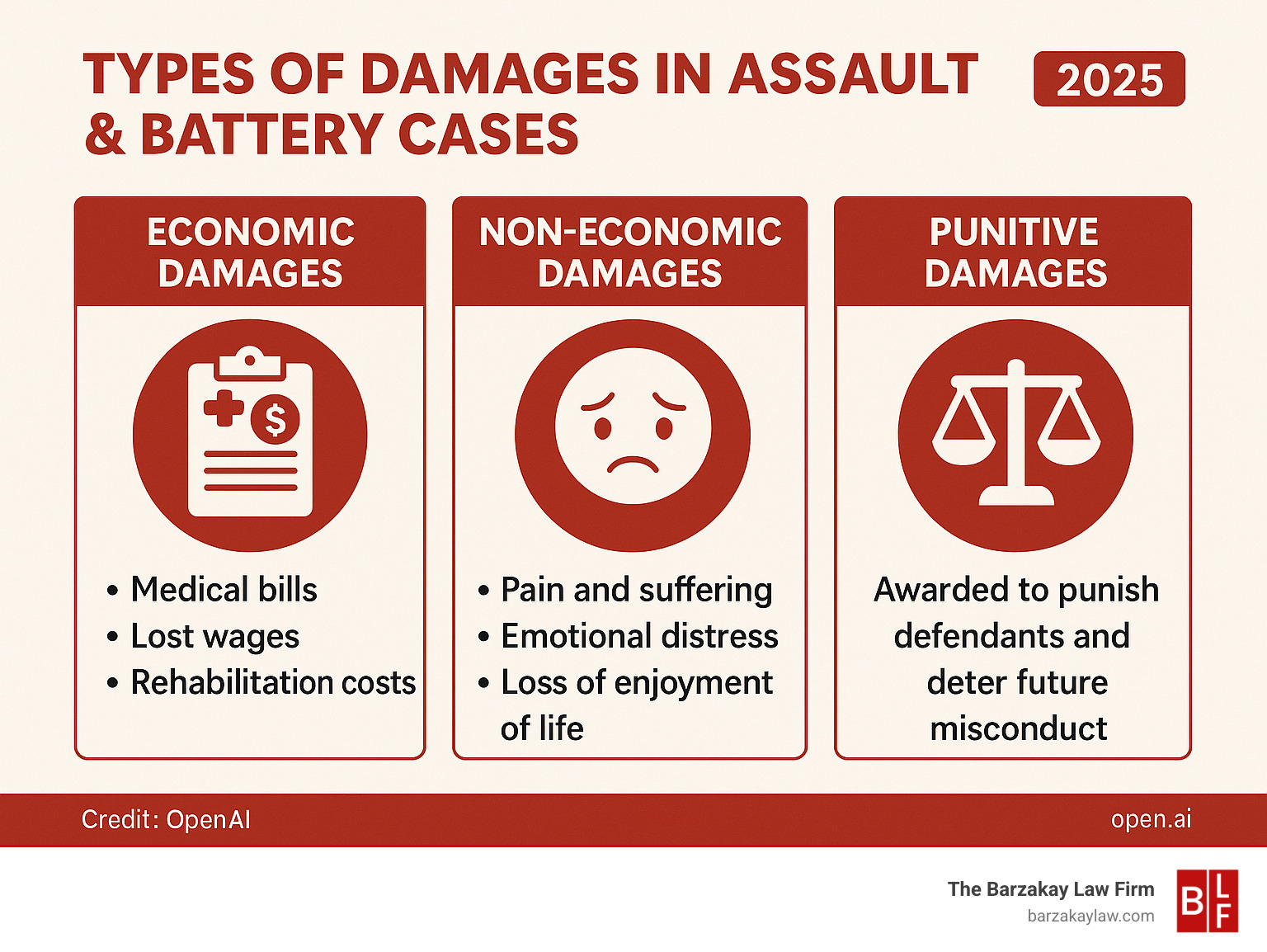Why Understanding Assault & Battery Settlement Amounts Matters
The average settlement for assault and battery cases ranges from a few thousand dollars for minor injuries to millions for severe, life-changing harm. Here’s what you need to know:
Settlement Ranges by Case Type:
- Minor injuries (bruises, cuts): $3,000 – $25,000
- Moderate injuries (broken bones, stitches): $25,000 – $100,000
- Severe injuries (brain trauma, permanent disability): $100,000 – $2,500,000+
- Cases with property owner liability: Often exceed $1,000,000
Key Factors That Affect Your Settlement:
- Severity of physical and emotional injuries
- Medical expenses (current and future)
- Lost wages and earning capacity
- Strength of evidence against the attacker
- Whether punitive damages apply
When you’re attacked, the financial and emotional wounds can last long after physical bruises heal. Victims often face medical bills, lost wages, and lasting trauma. In South Florida communities like Hollywood and Miami, these cases often involve premises liability, where a property owner’s failure to provide adequate security leads to an attack. Such cases can result in higher settlements as multiple parties may be responsible.
Unlike a criminal case that seeks to punish the offender, a civil lawsuit aims to compensate you for your losses. A criminal conviction is not required to win your civil case and recover money to help rebuild your life.

Understanding the Basics: Assault vs. Battery in a Civil Claim
While often used together when discussing an average settlement for assault and battery, “assault” and “battery” have distinct legal meanings. Assault is the fear of being hurt, while battery is the act of being hurt. Both are “intentional torts,” meaning someone deliberately harmed you.
Understanding this distinction is key to building a strong case in Florida and pursuing the compensation you deserve. The person who hurt you made an intentional choice, and they are responsible for the consequences, whether they threatened you, made physical contact, or both. This intentional element separates assault and battery cases from accidents.
What is Civil Assault?
Civil assault occurs when someone intentionally makes you fear imminent physical harm. The key is the fear—no physical contact is necessary. For example, if someone in a Hollywood parking lot aggressively raises their fist and threatens you, their threat of harm and your reasonable apprehension of contact could be assault.
For a claim to be valid, the act must be intentional, you must genuinely believe harm is coming, and that belief must be reasonable. The damage comes from the fear, anxiety, and emotional distress of believing you’re about to be hurt.
What is Civil Battery?
Battery is the physical part. It occurs when someone intentionally makes harmful or offensive contact with your body without your permission, which is a lack of consent. The contact doesn’t have to cause a major injury. A punch, an unwelcome shove, or grabbing an arm can all be battery.
If you’re at a Miami Beach restaurant and another patron pushes you, that push is battery. The severity of the physical injury is less important than the fact that someone intentionally touched you offensively without permission. Consent is a key factor; without it, even minor contact can be battery.
Calculating Your Claim: The Types of Damages You Can Recover
When you’re hurt by assault and battery, the law recognizes that your losses extend beyond medical bills. The average settlement for assault and battery reflects three types of damages designed to address the full impact on your life.

To maximize your recovery, it’s crucial to document everything—every expense, missed workday, and change to your daily life. We help our clients in Hollywood, Miami, and throughout South Florida do just that.
Economic Damages (Special Damages)
These are your tangible financial losses. They include:
- Medical expenses: ER visits, doctor’s appointments, prescriptions, physical therapy, and future medical needs.
- Lost wages: Income lost while you were unable to work.
- Future loss of earning capacity: For permanent limitations affecting your ability to work.
- Rehabilitation costs: Physical, occupational, or psychological therapy.
- Property damage: Costs to replace items broken during the attack, like glasses or a phone.
- Other costs: Such as household help or transportation for medical appointments.
Non-Economic Damages (General Damages)
These compensate you for intangible suffering that doesn’t come with a receipt but is a very real part of your experience. They include:
- Pain and suffering: For the physical pain of your injuries, both during and after the attack.
- Emotional distress: For psychological wounds like anxiety, depression, fear, or PTSD, which are common after a violent attack.
- Loss of enjoyment of life: When injuries prevent you from participating in activities you once loved.
- Scarring and disfigurement: For the ongoing emotional pain caused by visible reminders of the attack.
The Role of Punitive Damages
Punitive damages are different; they are meant to punish the defendant for outrageous behavior and deterring future conduct. Because assault and battery are intentional, courts are more willing to consider punitive damages. They may apply if the attacker acted with gross negligence or intentional malice, such as using a weapon.
In Florida, punitive damages are typically capped, but these limits may not apply if the attacker intended to cause serious harm or was under the influence. We evaluate every case to see if punitive damages are appropriate, as they can significantly increase your settlement.
What Is the Average Settlement for Assault and Battery?
One of the first questions we hear from clients is, “What’s the average settlement for assault and battery?” The truth is, there’s no single average because every case is unique. We focus on the specifics of your case rather than misleading averages.

Why finding an ‘average settlement for assault and battery’ is difficult
No two assaults are alike. A minor shove at a bar is vastly different from an attack in a parking garage that causes a brain injury. Key factors that influence the value include:
- Case uniqueness: The location, relationship to the attacker, and whether weapons were involved.
- Injury severity: This is often the biggest factor. Minor bruises lead to smaller settlements than permanent disabilities.
- Defendant’s conduct: Premeditated, vicious attacks are viewed more seriously and can lead to higher compensation, including punitive damages.
- Available evidence: Strong evidence like security footage, witness statements, and medical records strengthens your case.
- Insurance coverage: The practical limit of recovery often depends on available insurance. A property owner’s commercial policy can provide far more compensation than an individual attacker’s assets.
Estimated Settlement Ranges by Injury Severity
While we can’t give a magic number, these ranges are based on our experience handling these cases throughout South Florida. Your actual settlement could be higher or lower depending on your specific circumstances.
| Type of Injury/Assault | Estimated Settlement Range | Key Factors Influencing Amount |
|---|---|---|
| Minor Injuries | $3,000 – $25,000 | Bruises, cuts, soft tissue injuries, short recovery, minimal medical intervention. |
| Moderate Injuries | $25,000 – $100,000 | Broken bones, stitches, concussions, ongoing physical therapy, some lost wages, temporary impact on daily life. |
| Severe Injuries | $100,000 – $2,500,000+ | Traumatic brain injuries, spinal cord damage, permanent disability, disfigurement, long-term medical care, significant lost earning capacity, profound emotional distress. |
| Aggravated Assault | $50,000 – $1,000,000+ | Cases involving weapons, severe intent, or significant physical harm, often leading to higher non-economic and punitive damages. |
Minor cases involve injuries that heal quickly. Moderate injuries often require ongoing treatment and affect daily life for months. Severe cases involve life-altering injuries requiring extensive care. Brain injuries are particularly devastating; scientific studies on brain injury compensation show significant settlements, with severe cases reaching millions.
How a Property Owner’s Role Can Impact Your Settlement
The person who attacked you may not be the only one responsible. In places like Hollywood and Miami, we often find that property owners failed to keep their premises reasonably safe. This is known as negligent security.
Examples include assaults in dimly lit parking garages, hotels with broken security cameras, or apartment buildings with broken locks. When a property owner’s negligence contributes to an assault, they can be held liable. These inadequate security lawsuits often result in settlements over $1,000,000 because they involve large commercial insurance policies. Investigating property owner liability is a key part of our strategy to maximize compensation.
The Legal Journey: From Incident to Settlement
Understanding the legal process after an assault is key to securing a fair settlement. The journey might seem daunting, but breaking it down makes it manageable.

Criminal vs. Civil Assault Cases
After an assault, there can be two separate legal cases.
- Criminal cases are brought by the state to punish the offender with jail time or fines. The standard of proof is “beyond a reasonable doubt.” You are a witness, but the prosecutor is in control.
- Civil cases are your lawsuit to get compensation for your losses (medical bills, lost wages, pain and suffering). The standard of proof is lower: “more likely than not.”
You don’t need a criminal conviction to win your civil case. The two cases are independent, and a guilty plea in the criminal case can be powerful evidence for your civil claim. “Double jeopardy” does not prevent you from filing a civil suit.
Evidence Needed to Prove Your Claim
A strong case is built on solid evidence. Key pieces include:
- Police reports: An official record of the incident.
- Medical records: To document your injuries and treatment costs.
- Witness testimony: Independent confirmation of your account.
- Surveillance video: From stores, parking lots, or doorbell cameras.
- Photos of your injuries: To visually document the harm you suffered.
- Testimony from professionals: To explain the long-term impact of your injuries.
Florida’s Statute of Limitations
You must act quickly. Florida law gives you two years from the date of the assault to file a civil lawsuit. If you miss this deadline, you could lose your right to compensation forever.
While two years seems like a long time, evidence can disappear and witnesses’ memories can fade. That’s why it’s important to contact a lawyer as soon as possible after an incident. We’ve seen valid cases in South Florida lost because someone waited too long. Don’t let that be you.
Frequently Asked Questions about Assault & Battery Settlements
We know you have questions about the legal process. Here are answers to some of the most common ones we hear regarding the average settlement for assault and battery.
How long does it take to get a settlement for an assault case?
The timeline varies from a few months to a couple of years, depending on several factors. Case complexity is a major one; a straightforward case with clear video evidence will resolve faster than a complex one involving multiple parties. The negotiation process with the insurance company takes time. If a fair settlement can’t be reached, we may need to go to trial, which extends the timeline. We keep you informed every step of the way.
Can I sue for assault if I was not physically injured?
Yes. Civil assault is about being put in fear of immediate harm, not about physical contact. If someone threatened you or made you believe you were about to be attacked, you may have a case even without physical injuries. The law recognizes that the resulting fear and emotional trauma are real damages. To prove this, we work with therapists or counselors to document the psychological harm, such as anxiety or trouble sleeping. While these settlements are often smaller than cases with severe physical injuries, the emotional distress you suffered has value.
Do I have to pay taxes on my assault and battery settlement?
Generally, no. The IRS does not tax compensation for physical injuries or the related emotional distress. Money for medical bills, pain and suffering, and lost wages is typically tax-free. There are exceptions. Punitive damages, which are meant to punish the defendant, are usually taxable. Compensation for emotional distress not stemming from a physical injury might also be taxable. We can structure settlements to help minimize any tax burden and recommend consulting a tax professional for large settlements.
Maximizing Your Compensation and Next Steps
Getting the average settlement for assault and battery that reflects your losses involves taking the right steps from day one to protect your claim.
- Seek medical care immediately. Even if injuries seem minor, a doctor’s visit creates a crucial record linking the assault to your injuries.
- Report the incident to the police. A police report is a key piece of evidence.
- Preserve evidence. Take photos of your injuries and the scene. Get contact information from witnesses. Note the location of any security cameras, as footage is often deleted quickly.
- Stay off social media. Anything you post can be used by the defense to argue you aren’t truly suffering.
- Don’t talk to the other side’s insurance company. They are not on your side. Direct them to your attorney.
We understand the full scope of your damages, from medical bills and missed work to the lasting emotional impact like anxiety or depression. We also investigate whether property owners share responsibility for inadequate security, which is common in assaults at apartment complexes, bars, or shopping centers. These cases can lead to higher settlements due to large commercial insurance policies.
At The Barzakay Law Firm, we have guided many assault victims through this process in South Florida communities like Hollywood, Miami, and Boca Raton. We work on a contingency fee basis, so you pay nothing unless we win your case. This lets you focus on healing while we handle the legal fight.
Your case is unique. We take the time to understand how this incident has changed your life. If you’ve been the victim of assault and battery, contact us for a confidential consultation to understand your rights and fight for the compensation you deserve.
